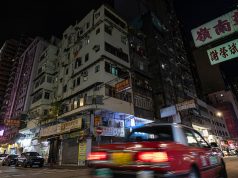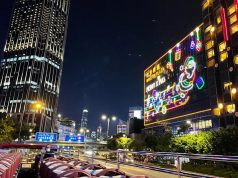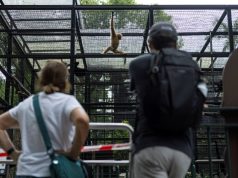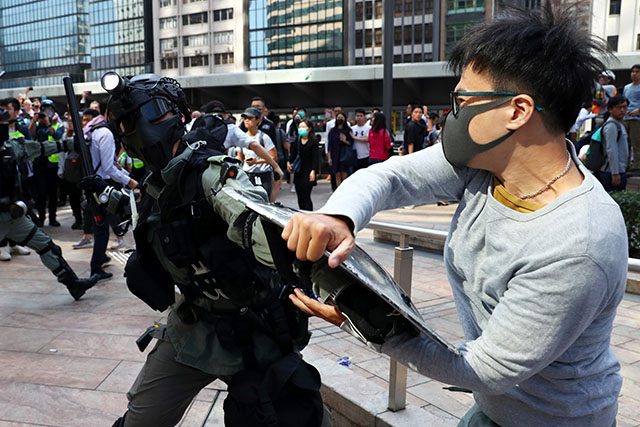
HONG KONG — Finance firms in Hong Kong urged staff on Wednesday to seek safety or work from home as anti-government protests paralyzed the city’s business district for the third day in one of the biggest disruptions faced by the Asian finance hub.
While flexible work arrangements have become the norm for many big firms in Hong Kong as violence escalates, some of the latest warnings included more urgent concerns, after tear gas billowed by some of the world’s tallest and most expensive buildings this week.
“For your safety, pls shelter in place where necessary,” a text message alert sent to staff at J.P.Morgan, and seen by Reuters, read.
Most bank branches in the business district, called Central, pulled down their shutters on Wednesday, while protesters smashed the glass facade of a Bank of Communications (BoCom) branch and sprayed graffiti reading “Fight for freedom!” near the entrance.
Many mainland Chinese businesses, in particular banks such as BoCom, have been attacked by protesters angry at what they see as interference by Beijing in their city, despite a guarantee of autonomy when the former British colony returned to Chinese rule in 1997.
Standard Chartered has asked staff to consider work arrangements, such as working from home and rescheduling meetings and trips, as appropriate, a bank spokeswoman said.
Representatives of other banks including UBS, Citigroup, Societe Generale and Bank of America said their staff had been given permission to work remotely. A source at Prudential said all staff had been sent home.
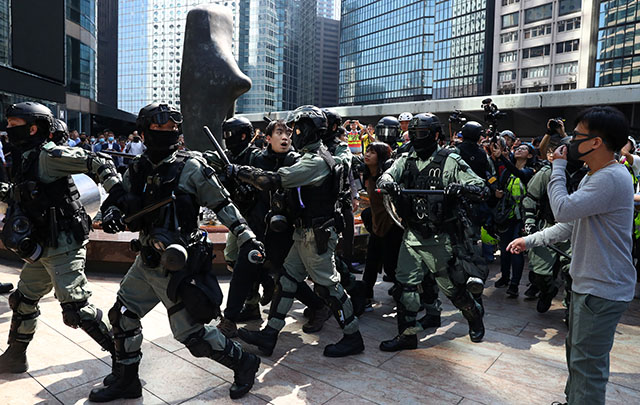
JPMorgan declined to comment, while Prudential did not immediately respond to a Reuters request for comment.
Hong Kong anti-government protesters paralyzed parts of the city this week, with some transport links, schools and many businesses closing amid some of the worst violence since protests escalated more than five months ago.
The city is one of the world’s most important financial hubs with total banking, fund and wealth management assets worth more than $6 trillion.
‘Scared to go to work’
As more than 1,000 protesters occupied main roads in Central, frustrated men in suits were seen kicking bricks off the road, while other office workers on their lunch breaks, most in face masks, joined the crowds in chants for greater democracy.
“I’ve been here 26 years and I’m sad and disgusted at what I’m seeing,” Nicholas Loup, group vice chairman and chief executive of Chelsfield Asia, a property investment firm, told Reuters as some protesters crouched behind umbrellas nearby and rows of riot police watched.
“They are terrorizing ordinary people. My office workers are scared to go to work.”
Loup said some of his staff were working from home and he closed the office early on Wednesday.
Another business owner passing through the crowd, who only identified himself as Paul, said he had to put plans to sell part of his insurance firm on hold because of the protests, as potential investors wanted to see how the situation developed.
“It’s now beyond the stage of protests and just vandalism for the sake of it, without an end game in sight,” he said.
The Hong Kong Association of Banks urged clients to call hotlines or use online services.
Victor Filamor, partner at executive search firm Stones International in Hong Kong said the movement of the protests downtown marked an escalation that could deter top talent from coming to the city.
“All of this news percolates outside, you know? And in the last couple of days things have come to a head, and I think it’s going to get worse — a lot worse — before it gets better,” Filamor said.
— Reporting by Scott Murdoch and Sumeet Chatterjee; Additional reporting by Anne Marie Roantree and Tom Westbrook; Writing by Marius Zaharia; Editing by Robert Birsel






